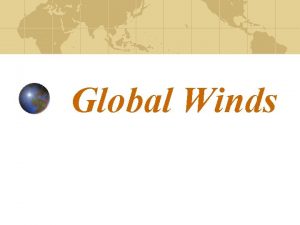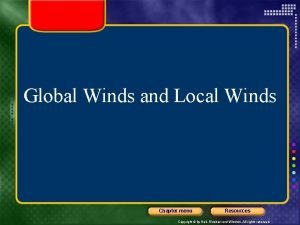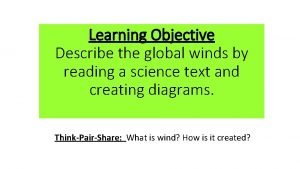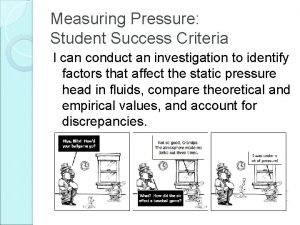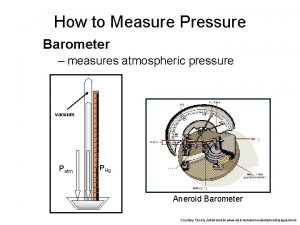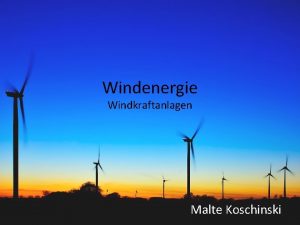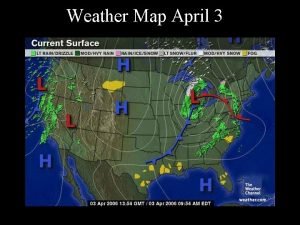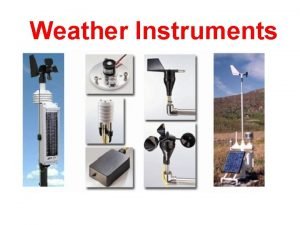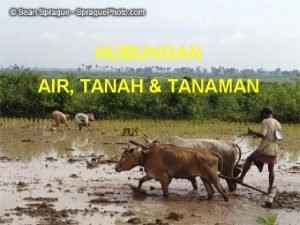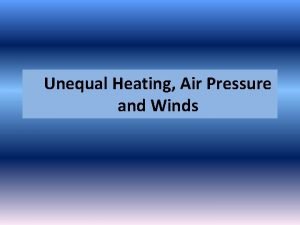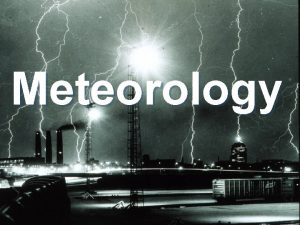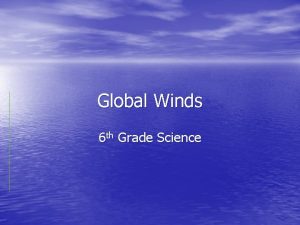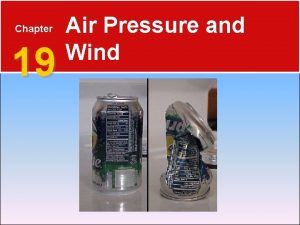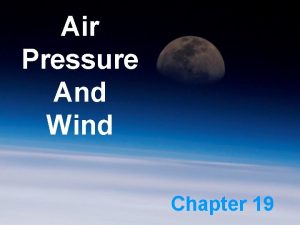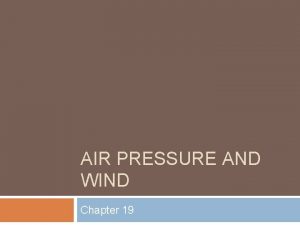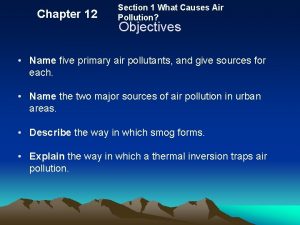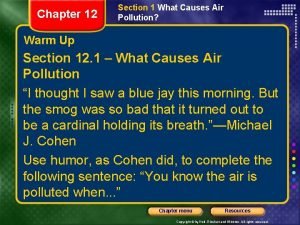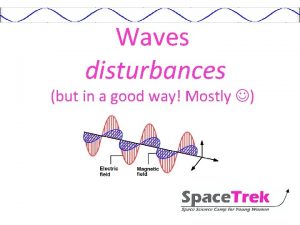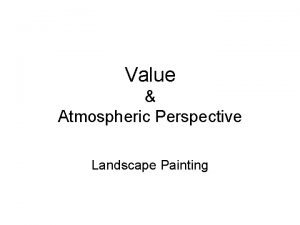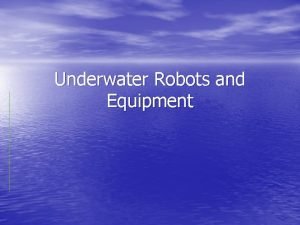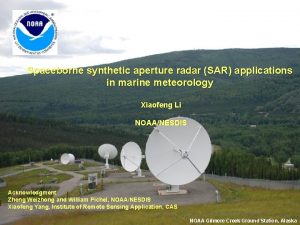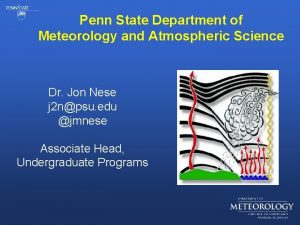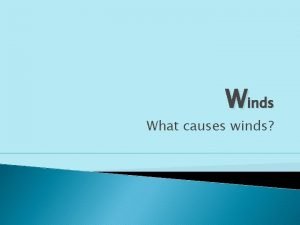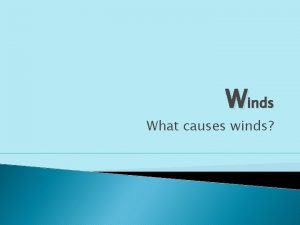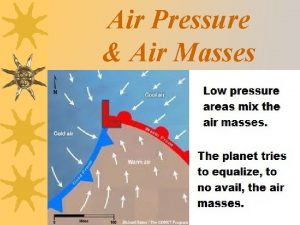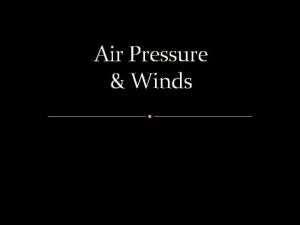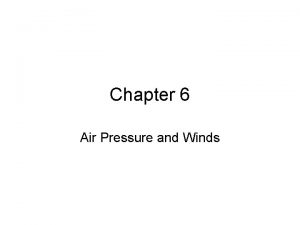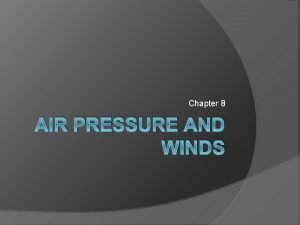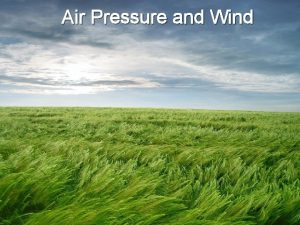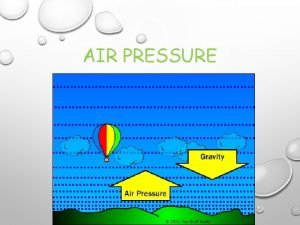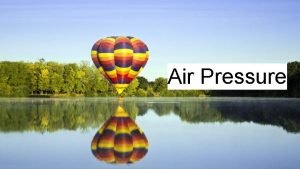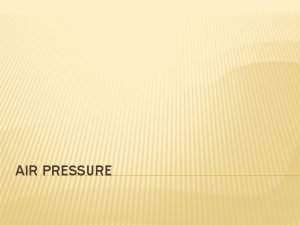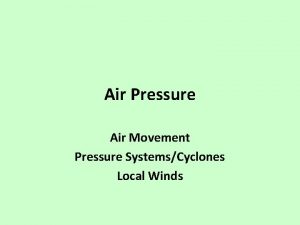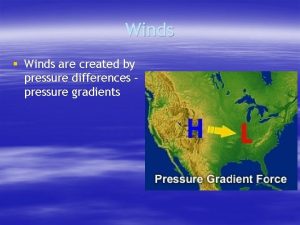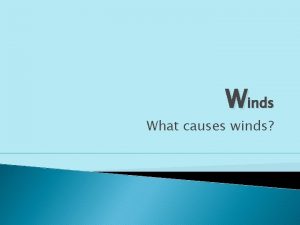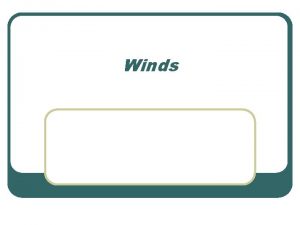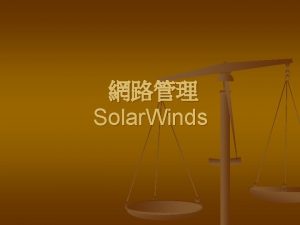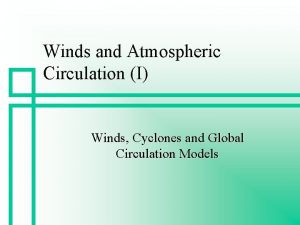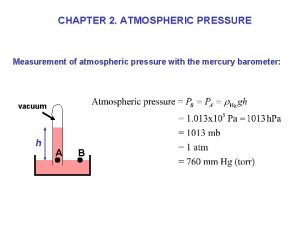Chapter 6 Air Pressure and Winds Atmospheric pressure


























- Slides: 26

Chapter 6: Air Pressure and Winds Atmospheric pressure n Measuring air pressure n Surface and upper-air charts n Why the wind blows n Surface winds n Measuring and determining winds n

Atmospheric Pressure n air pressure - definition • Air pressure is, quite literally the weight of the atmosphere above us. n air pressure and temperature P = ρRT at constant P, cold parcel is denser; at constant T, higher surface P means denser air; at constant density, higher surface P means higher air T n pressure gradient force

Same density Stepped Art Fig. 6 -2, p. 143

Measuring air Pressure Standard atmospheric pressure: 1013. 25 mb = 1013. 25 h. Pa = 29. 92 in. Hg

Barometers n n mercury barometer aneroid barometer altimeter barograph


Pressure Readings n station pressure after corrections of temperature, gravity, and instrument error (surface tension of mercury) n sea-level pressure after corrections of altitude (1 mb/10 m) n isobars

Surface and Upper Air Charts isobaric maps n contour lines n ridges n troughs n • Color-filled contour maps are the same as ordinary contour maps, except that the area between adjacent lines is filled in with color.

Figure 2, p. 150

Why the Wind Blows Newton’s Laws of Motion n Newton’s first law An object at rest (or in motion) will remain at rest (or in motion) as long as no force is exerted on the object n Newton’s second law F = ma (force = mass times the acceleration) acceleration could be change of speed or direction Four forces include pressure gradient force, Coriolis force, centripetal force (or its opposite, centrifugal force), and friction

Forces that Influence the Wind n net force and fluid movement • Wind is the result of a balance of several forces.

Pressure Gradient Force n pressure gradient (pressure difference/distance) n pressure gradient force (from high to low pressure) n strength and direction of the pressure gradient force • The horizontal (rather than the vertical) pressure gradient force is responsible for causing air to move.


Coriolis Force real and apparent forces n Coriolis force n strength and direction of the Coriolis force n factors that affect the Coriolis force n object’s speed, earth rotation, latitude • It is sometimes claimed that “water swirls down a bathtub drain in opposite directions in the northern and southern hemispheres”. This is not true.

Fig. 6 -14, p. 153

Straight-line Flow Aloft combination of the pressure gradient and Coriolis forces n geostrophic wind n • Geostrophic winds can be observed by watching the movement of clouds.

Curved Winds Around Lows and Highs Aloft cyclonic and anticyclonic flow n centripetal force (opposite to centrifugal force) n gradient wind n

Winds on Upper-level Charts gradients in contour lines n meridional and zonal winds n • Height contours on upper-level charts are interpreted in the same way as isobars on surface charts.

Figure 4, p. 157

Surface Winds planetary boundary layer n frictional effects on the wind n • Most people rarely venture out of the planetary boundary layer.

Fig. 6 -21, p. 160

Winds and Vertical Motions divergence and convergence n hydrostatic equilibrium (vertical PGF = gravity) n

Measuring and Determining Winds

The Influence of Prevailing Winds characterization of wind direction n prevailing winds n wind rose n • Wind direction is defined in the opposite way as ocean currents: a southerly current means water is moving towards the south.

Wind Instruments wind vane n anemometer n aerovane n radiosonde n wind profiler n • By observing flags and smoke plumes, our eyes are also effective wind instruments.

Wind Power Fig. 6 -29, p. 163
 Global winds and local winds worksheet answers
Global winds and local winds worksheet answers Easterlies
Easterlies Global wind belts
Global wind belts How are global winds and local winds different
How are global winds and local winds different Easterlies
Easterlies Pressure at different altitudes
Pressure at different altitudes Gauge pressure formula
Gauge pressure formula Atmospheric pressure
Atmospheric pressure High pressure and low pressure
High pressure and low pressure Denture retention definition
Denture retention definition Usairnet temperature map
Usairnet temperature map Hail
Hail Hubungan air dengan tanah
Hubungan air dengan tanah Polar air masses have low air pressure true or false
Polar air masses have low air pressure true or false Study jams air pressure and wind
Study jams air pressure and wind High pressure winds
High pressure winds High pressure winds
High pressure winds A land breeze usually originates during the
A land breeze usually originates during the Chapter 19 air pressure and wind
Chapter 19 air pressure and wind Chapter 19 air pressure and wind
Chapter 19 air pressure and wind Section 1 what causes air pollution
Section 1 what causes air pollution Chapter 12 air section 1 what causes air pollution
Chapter 12 air section 1 what causes air pollution Atmospheric opacity
Atmospheric opacity Atmospheric perspective landscape
Atmospheric perspective landscape Atmospheric diving system
Atmospheric diving system Atmospheric gravity waves
Atmospheric gravity waves Penn state meteo
Penn state meteo


